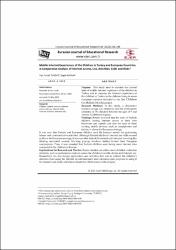| dc.contributor.author | Turgut, Yiğit Emrah | |
| dc.contributor.author | Kurşun, Engin | |
| dc.date.accessioned | 2020-12-19T20:43:22Z | |
| dc.date.available | 2020-12-19T20:43:22Z | |
| dc.date.issued | 2020 | |
| dc.identifier.citation | Turgut, Y.E., Kursun, E. (2020). Mobile internet experiences of the children in Turkey and European countries: a Comparative analysis of internet access, use, activities, Skills and risks. Eurasian Journal of Educational Research, 225-248. | |
| dc.identifier.issn | 1302-597X | |
| dc.identifier.issn | 2528-8911 | |
| dc.identifier.uri | https://doi.org/10.14689/ejer.2020.88.10 | |
| dc.identifier.uri | https://app.trdizin.gov.tr/makale/TXpnd01qRTFOUT09 | |
| dc.identifier.uri | https://hdl.handle.net/11436/5865 | |
| dc.description.abstract | Purpose: This study aims to examine the current state of mobile Internet experience of the children in Turkey and to compare the Internet experiences of the children in Turkey to the children living in seven European countries included in the Net Children Go Mobile (NCGM) project. Research Methods: In this study, a descriptive research design was employed and the participants consisted of 784 children between the ages of 9 and 16 from 12 different regions. Findings: Results revealed that the ratio of Turkish children having Internet access in their own bedrooms and outside and also the ratio of them owning mobile devices, such as smartphones and tablets, is above the European average. It was seen that Turkish and European children used the Internet mostly for performing leisure and communicative activities. Although Turkish children's Internet use skills seemed to above the European average, it was seen that their skills towards safe Internet browsing like filtering unwanted content, blocking pop-up windows lacked behind their European counterparts. Thus, it was revealed that Turkish children were facing more Internet risks compared to the children in Europe. Implications for Research and Practice: Future studies can utilize more detailed evaluation methods, such as performance tasks to assess the children’s mobile device and Internet use. Researchers can also design applications and activities that aim to redirect the children’s attention from using the Internet for entertainment and communication purposes to using it for research and study and then evaluate the effectiveness of the designs. | en_US |
| dc.language.iso | eng | en_US |
| dc.rights | info:eu-repo/semantics/openAccess | en_US |
| dc.subject | Çocuklar | en_US |
| dc.subject | Mobil İnternet | en_US |
| dc.subject | İnternet Erişimi ve Kullanımı | en_US |
| dc.subject | İnternet Becerileri | en_US |
| dc.subject | İnternet Faaliyetleri | en_US |
| dc.subject | İnternet Riskleri | en_US |
| dc.title | Mobile internet experiences of the children in Turkey and European countries: a Comparative analysis of internet access, use, activities, Skills and risks | en_US |
| dc.type | article | en_US |
| dc.contributor.department | RTEÜ, Eğitim Fakültesi, Bilgisayar ve Öğretim Teknolojileri Eğitimi Bölümü | en_US |
| dc.contributor.institutionauthor | Turgut, Yiğit Emrah | |
| dc.identifier.doi | 10.14689/ejer.2020.88.10 | |
| dc.identifier.volume | 20 | en_US |
| dc.identifier.issue | 88 | en_US |
| dc.identifier.startpage | 225 | en_US |
| dc.identifier.endpage | 248 | en_US |
| dc.ri.edit | oa | en_US |
| dc.relation.journal | Eurasian Journal of Educational Research | en_US |
| dc.relation.publicationcategory | Makale - Uluslararası Hakemli Dergi - Kurum Öğretim Elemanı | en_US |


















